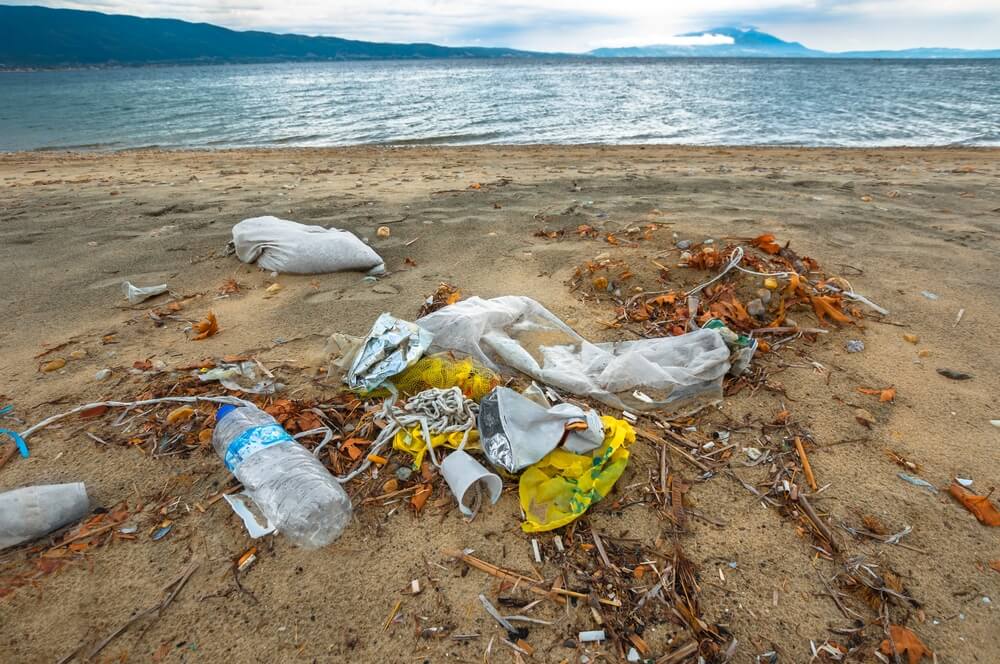Littering affects climate change because most materials like plastic will not break down over time or take hundreds of years to break down.
This causes greenhouse gases as well that leak into our atmosphere and causes our planet to become hotter.
Litter is becoming more and more detrimental to our planet and we need to take care of it better.
One way you can do this is by eliminating your use of single-use plastics and by recycling all of the materials that you can.
In this article, we will discuss how littering can affect our planet and what you can do to lessen your carbon footprint.
Does litter contribute to Climate Change?
Yes! Littering contributes to climate change because many of our materials end up in landfills and our oceans.
When it ends up in landfills, unfortunately, they fill up and will not break down over time.
When our materials don’t break down over time, they just sit in our landfills, and eventually, we will have to create new landfills to hold our garbage.
This is detrimental as we run out of space to do this.
Can we burn our garbage?
Yes, we technically can burn most of our garbage, but this is also damaging our planet.
If we are burning our garbage in landfills, then we are producing gases from this burning which is then in our atmosphere.
This damages the ozone layer and makes our planet hotter, which is not good.
Our oceans become hotter destroying ocean life and we lose more and more landmass as many icebergs melt.
Why is it bad to litter?
Littering is bad because we want to keep our planet clean and healthy.
If we dump our garbage on the sides of the road, it will likely stay there for hundreds of years.
When materials like plastic are littered on the ground, they can produce different gases that are then released into the atmosphere.
These gases are harmful to our planet, so this is why it is so important to recycle whenever possible and reuse these materials.
How does waste lead to Climate Change?
Waste leads to climate change because if we continue to neglect to recycle, then our landfills and forests take on this garbage that we create.
Waste can take a long time to break down and if we are not disposing of it properly, it can not only produce harmful gases, but it can also be an eyesore.
You can learn more about climate change and its effects on our planet here!
How do plastic bags affect Climate Change?
Plastic bags affect climate change because they can take hundreds of years to break down.
Plastic should already be recycled so that it can be reused and not stuck in our landfills.
How do plastics and litter contribute to Global Climate Change?
Plastic bags and other litter contribute to Global Climate Change because when they are left in landfills they produce greenhouse gases.
When these gases enter the atmosphere, they deteriorate the ozone layer.
The ozone layer protects our planet from the heat of the sun and regulates our temperature.
When our planet gets hotter, our planet starts to deteriorate.
What is the main cause of climate change?
There are many different causes of climate change, but the most prevalent one is greenhouse gases and other gases that enter the atmosphere.
One of the factors that produce the most gases that enter our atmosphere is cows.
Cows manure produces so much gas that this is one of the leading causes of gas that destroy our ozone layer.
You can learn more about climate change and the effects of plastic waste here!
How does industrial waste affect climate change?
Industrial waste affects climate change because of the gases that are produced from making materials such as plastic.
Industrial waste is produced from large factories that make our materials for packaging and single-use items.
Does recycling help climate change?
Recycling can greatly improve climate change as long as we are doing it right.
We need to recycle the proper materials in the proper bins and we also have to sort our recycling.
Recycling can’t have any food waste on it or human waste as then it is likely to be refused at recycling sorting centers and end up in landfills.
What are virgin materials?
Virgin materials are materials that are used in their raw form. An example of raw materials is wood and metal.
These materials are a limited resource and sometimes can’t be recycled or reused.
What is the easiest way to stop climate change?
The easiest way to stop climate change that anyone can do is to start recycling and stop using single-use plastics and materials.
Anyone can follow these steps and do their part to save the planet.
Do cars contribute to climate change?
Yes, they do! Cars emit gases that are harmful to our ozone layer.
Another great way to reduce your carbon footprint on our planet is to use your car less.
Some ways you can do this is by riding public transit, using a bicycle, or by simply walking more.
When you use a bicycle or walk more, this is also improving your overall health, so it is a win-win situation.
What are single-use plastics?
Single-use plastics are materials like straws, plastic utensils, plastic bags, and most plastic packaging.
Things like styrofoam are also considered single-use plastic because they can’t be recycled.
How can I stop using single-use plastics?
You can limit your use of these materials by asking restaurants not to give them to you, and by using things like reusable shopping bags and glass jars.
If you are given these plastic materials, try to reuse them as much as possible in your home and then recycle them if you can.
You should also try not to purchase these items yourself when possible.
Sometimes it’s convenient to get single-use items for a party or get together, but try to avoid it if you can.


